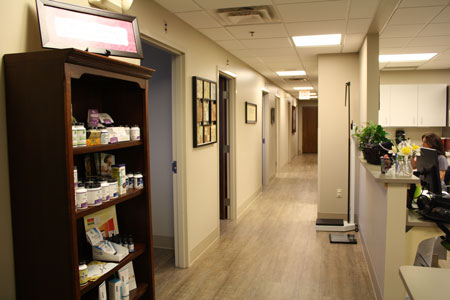Content reviewed by Marcy D. Markes, MSN, APRN, FNP-BC
After an allergy test, an individual may want further treatment for their allergies. We use your specific allergy test results to recommend a customized allergy treatment plan. Our allergy treatment offered may help those with seasonal allergies, indoor allergies, food allergies, and even topical poisons such as poison ivy. Our allergy treatment processes include medication, environmental control measures, natural supplements, sublingual immunotherapy and allergy immunotherapy.
Allergy Immunotherapy
 Allergy Immunotherapy is the only FDA approved treatment proven to target the actual cause of allergies. Immunotherapy works by “re-educating” the immune cells that are causing the allergy symptoms. This is done through carefully calculated dosages of the actual allergy, starting with a small dosage and then gradually increasing the amount over time. As a result, Allergy Immunotherapy can actually decrease your dependency on allergy medication and even reduce possible asthma exacerbations.
Allergy Immunotherapy is the only FDA approved treatment proven to target the actual cause of allergies. Immunotherapy works by “re-educating” the immune cells that are causing the allergy symptoms. This is done through carefully calculated dosages of the actual allergy, starting with a small dosage and then gradually increasing the amount over time. As a result, Allergy Immunotherapy can actually decrease your dependency on allergy medication and even reduce possible asthma exacerbations.
What to expect from Allergy Immunotherapy?
Allergy Immunotherapy is administered via subcutaneous injections (allergy shots). These are given on a weekly basis during the first 6 months of therapy, also known as the buildup phase.
- The buildup phase takes anywhere from 3-6 months. Usually shots are given 1-3 times a week during the buildup phase. During this time, the allergy dosage increases with each shot.
- The maintenance phase takes anywhere from 3-6 years after the buildup phase. Continuing to increase the dosage amount. Usually shots are given once a month during the maintenance phase.
After the buildup phase and you are tolerating the maintenance dose and concentration well, shots are then given every 1-2 weeks for a year. The number of shots will eventually spread out to once monthly for a total of 5 years of therapy. When allergy shots are working well, you could see an improvement in your symptoms in as little as 3-6 months.
Results from Allergy Immunotherapy
After about 3-6 months of Allergy Immunotherapy treatment, you should notice improvements in your allergy symptoms. After two years is when one would notice the most significant improvements. Depending on the individual, some people can stop the treatment after a couple years. Others may need to continue treatment so that symptoms stay under control.
Other Allergy Treatment Options
There are many other allergy treatment options that are available at Columbia Allergy and Asthma Specialists. We offer options to specifically meet your allergy needs and help you feel your best self. Other allergy treatment options include medication, environmental control measures natural supplements, sublingual immunotherapy and over the counter medications available.
Environmental Control Measures
Environmental control measures help eliminate triggers that initiate the allergic reaction and reduce the conditions that sustain it. An example of an environmental factor are dust mites. Dust mites are usually found within your home and can cause allergies without you even knowing that is the cause. Dust mite environmental control measures may include process of encasing your pillows, box spring, and mattress. From there, the allergy specialist would also recommend you wash your bedding once weekly in hot water and dried in a hot dryer. Other environmental control measures may include reducing the number of stuffed animals your child’s bedroom, regularly dusting, and regularly vacuuming.
Besides dust mites, pollen, animals, pests, and indoor molds can also be environmental factors that cause allergies. Through environmental control measures, you can be somewhat relieved of your allergy symptoms, but to be close to fully relieved of your allergy symptoms it is best to see an allergy specialist.
Allergy Medications
When deemed the appropriate treatment plan, Columbia Allergy and Asthma Specialists provides its patients with the right prescription or recommendations for over-the-counter medication. Depending on what you are allergic to, the allergy provider will take that information and prescribe the best allergy medication for your specific needs. Whether our allergy provider can meet your medicine needs with over-the-counter or prescription medication, we will always put your needs first.
Our Allergy Treatment Process
What should a patient expect from allergy treatment?
The first thing a patient should expect from our allergy treatment process is a consultation visit. That means our allergy provider will review your history, family history, and your medical history. After reviewing all your history, our allergy provider will perform a physical and discuss the symptoms you have been experiencing. Some questions you might be asked are, “How long have you been having these symptoms?”, “Has anything you have tried help relieve your symptoms?”, and “What makes your symptoms worse?”.
How does the allergy treatment process work?
After discussing your allergy symptoms, our allergy provider will start the allergy screening process. The allergy screening process is a way in which we test to see what exactly you are allergic to. First, the allergy screening process starts when our allergy staff applies drops of fluid (antigen) onto your skin and barely scratching it with a tool similar to a brush. This allergy testing process is a needle-free allergy testing, which is preferred by most of our patients. While you are being tested for various allergies, there might be a feeling of a mosquito bite on your skin. If the “scratch” testing causes your skin to look and feel like a mosquito bite, that means the test is positive. A positive result means that you are in-fact, allergic to that antigen.
What are the results from allergy treatment usually?
Following the allergy scratch test, the allergy provider will inform you what antigens caused a positive result and negative allergy testing result. From there, the allergy provider will discuss option of care. The allergy treatment options may include a change in medication, environmental control changes, natural supplements, sublingual immunotherapy and allergy immunotherapy.
